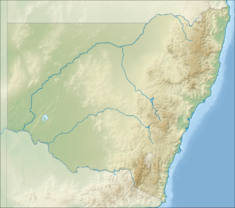Woronora Reservoir
| Woronora Dam | |
|---|---|

Aerial view of Woronora Dam reservoir
|
|
|
Location of the Woronora Dam
in New South Wales |
|
| Country | Australia |
| Location | south of Sydney, New South Wales |
| Coordinates | 34°6′40″S 150°56′4″E / 34.11111°S 150.93444°ECoordinates: 34°6′40″S 150°56′4″E / 34.11111°S 150.93444°E |
| Status | Operational |
| Construction began | 1927 |
| Opening date | 1941 |
| Construction cost | A$13 million |
| Owner(s) | Sydney Catchment Authority |
| Dam and spillways | |
| Type of dam | Gravity dam |
| Impounds | Woronora River |
| Height | 66 m (217 ft) |
| Length | 390 m (1,280 ft) |
| Dam volume | 285×103 m3 (10.1×106 cu ft) |
| Spillway capacity | 1,470 m3/s (52,000 cu ft/s) |
| Reservoir | |
| Creates | Woronora Dam |
| Total capacity | 71,790 ML (2,535×106 cu ft) |
| Catchment area | 75 km2 (29 sq mi) |
| Surface area | 380 ha (940 acres) |
The Woronora Dam is a concrete gravity dam with an uncontrolled serpentine spillway across the Woronora River, located south of Greater Metropolitan Sydney, in New South Wales, Australia. The principal purpose of the dam is for potable water supply for Sydney's southern suburbs and the northern suburbs of the Illawarra region. The impounded 71,790-megalitre (2,535×106 cu ft) reservoir is also called Woronora Dam and is sometimes incorrectly called Lake Woronora.
Water was first supplied to the Sutherland Shire in 1911 when a 150-millimetre (5.9 in) pipe was laid from Penshurst Reservoir across Georges River at Tom Ugly's Point to Miranda. In 1920 a scheme to supply water from the Woronora River to Sutherland and Cronulla was rejected. It was resurrected five years later when the then Metropolitan Water Sewerage and Drainage Board became the sole constructing authority for water supply works in the metropolitan area. The scheme involved the construction of a dam, which could be increased in size if necessary, on the Woronora River, about 24 kilometres (15 mi) upstream of its junction with the Georges River.
Construction of the dam began in 1927, the fifth dam built as part of Sydney's water supply. As forecast, the size of the dam wall had to be increased two years later. Workers' accommodation was spartan but functional with small bungalows built of fibrolite and placed on brick or concrete piers on the sloping ground. In 1930 The Depression intervened, suspending work on the dam. The men were forced to look for work further afield, even interstate, often leaving their families behind to live on the Woronora site. Some families had strong ties to the history of Sydney's dams, moving from the Nepean Dam project to Woronora, and then onto Warragamba. Other workers on Woronora Dam were former coal miners from nearby Helensburgh. Late in 1931 the Unemployment Relief Account released funds to build a weir to provide water to the Sutherland-Cronulla area and four years later, work resumed on the dam itself.
...
Wikipedia

